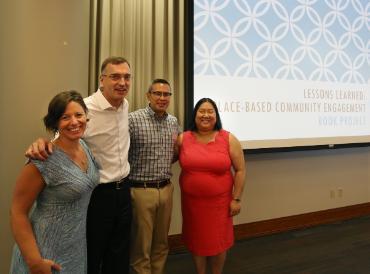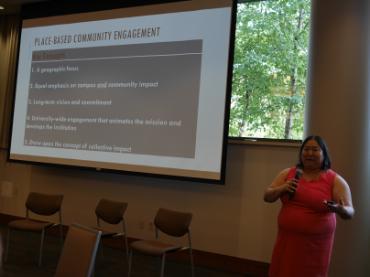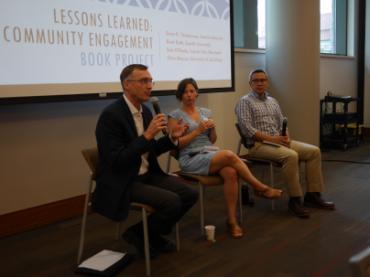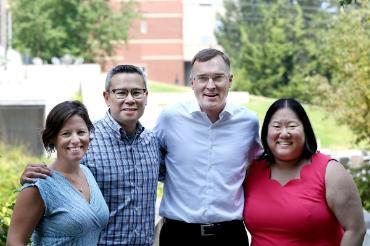
Place-Based Community Engagement in Higher Education
Book by Kent Koth and Erica Yamamura
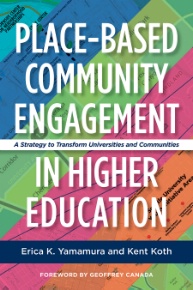
View the Promotion Flyer with 20% off discount code.
While an increasing number of universities have or are committed to engaging their campuses in their surrounding communities, many recognize they lack the strategic focus and resources to maximize and sustain their impact on those communities. Place-based community engagement provides a powerful way to creatively connect campus and community to foster positive social transformation.
Book talks, workshops and consultations available upon request.
Contact Erica Yamamura at yamamur1@seattleu.edu or Kent Koth at kothk@seattleu.edu
Listen
This Compact Nation Podcast features Kent Koth speaking with Emily Shields (starting at minute 18) following his keynote address at the Iowa Campus Compact Conference:
Bios
Erica K. Yamamura Ph.D. is an Associate Professor and Program Liaison Coordinator of the Student Development Administration Program in the College of Education at Seattle University. As a faculty member, she has utilized service-learning and community-based projects as part of her pedagogy at Carleton College, Texas State University, and Seattle University. For the last six years at Seattle University, she has engaged in project-based learning in her required student development theory course, one of the few in the country that utilizes this pedagogy in graduate education in the field of student affairs. Since 2013, Dr. Yamamura has also conducted research on promising practices arising from the Seattle University Youth Initiative.
As a graduate student in the top-ranked Higher Education and Organizational Change program at UCLA, Dr. Yamamura served as a research assistant working on a quantitative longitudinal study of service and service-learning for Dr. Alexander Astin’s grant with the Atlantic Philanthropies. She also served as a Teaching Associate for an innovative college-access service learning program, the Career-Based Outreach Program (CBOP) at UCLA which provided hundreds of hours of college preparatory activities to low income and under-resourced schools in urban Los Angeles.
In addition to her teaching and scholarly activities, Dr. Yamamura has prior experience as a practitioner in the field of community engagement. She served as a Site Coordinator at a Title 1 majority Latina/o school in the Los Angeles Unified School District working with industry, community organizations, and local colleges to build an academic mentor program on the campus. She also served as an Educational Coordinator at the University of California, Los Angeles in the Center for Community Learning where she was the liaison for the undergraduate education minor, served as an internship coordinator for educational internships, coordinated two AmeriCorps grants (Students in Service and Bonner Foundation Fellows), and maintained a number of public school partnerships as part of the UCLA in LA initiative. She received her BA in Political Science and Asian American Studies, and MA and Ph.D. in Education (Higher Education and Organizational Change) from the University of California, Los Angeles.
Kent Koth M.A. is the founding director of the Seattle University Center for Community Engagement. In this role Kent has overseen a rapid expansion of campus-community partnerships that have received national recognition including the 2012 President’s National Community Service Higher Education Award. Since 2009, he has also led the Seattle University Youth Initiative, a long-term commitment by Seattle University faculty, staff and students from all disciplines to join with parents, the Seattle School District, the City of Seattle, foundations, and more than 30 community organizations to empower the children of Seattle to succeed in school and life.
As an adjunct faculty member in the Seattle University Interdisciplinary Liberal Studies Program, Kent has taught courses focusing on leadership and community engagement. He has also written, consulted and presented extensively on topics of spirituality and service-learning, place-based community engagement and the ethics of university-community partnerships.
With support from the Annie E. Casey Foundation, Kent is currently leading an effort to create a national network of universities pursuing place-based community engagement. Since 2014, Seattle University, through Kent’s leadership, has organized five Place-Based Justice Institutes for teams from 30 institutions and communities.
Earlier in his career, Kent served as Program Director at the Haas Center for Public Service at Stanford University and taught several courses in the Stanford University Urban Studies Program. Kent also worked as Executive Director of Youth Community Service in Palo Alto, California and led Willamette University’s effort to create a community engagement program.
Kent’s career in community engagement began when, upon finishing his undergraduate degree, he received a Samuel Huntington Public Service Fellowship to mobilize students from 10 universities and colleges in Oregon to serve and learn during their academic breaks.
